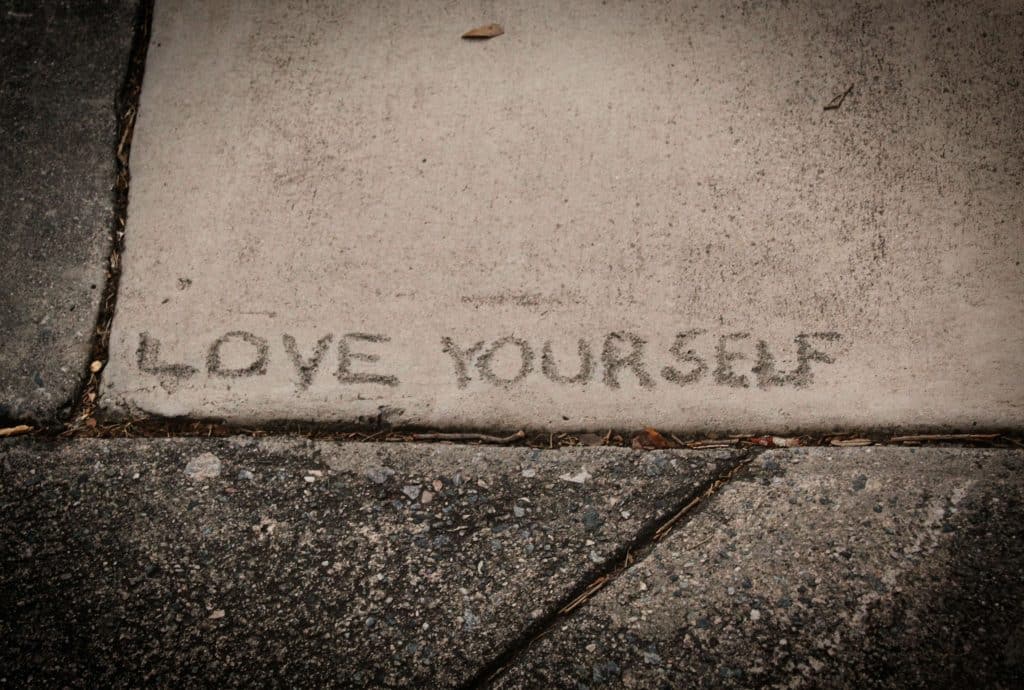Heartbroken? 6 Tips to Cope with a Breakup [+ 15 Self-Help Resources]

Published on February 16, 2021 Updated on March 30, 2023
The way we experience life and the way we deal with difficult situations depends largely on the way we think and the way we see the world. You’ve probably experienced this many times: a small change in your mindset makes a drastic improvement in your life and your well-being. The same rule applies when you’re heartbroken: developing the right mindset is key for your healing.
In this article, we won’t offer you “quick fix” tips on how to get over your ex, such as “start going to the gym”, “redecorate your apartment”, and “eat healthy”. Instead, we’ll share with you why and how to change your mindset to get over heartbreak once and for all.
In addition to our top 6 tips, we’ve included 15 self-help resources (at the end of the blog post), which will help you start cultivating the heartbreak-healing mindset right away.
This blog post is a part of our “Heartbroken” series. For more tips, check out our Instagram account and Part II of this series “How to Get Over Your Ex – 7 Tips to Heal Fast After a Breakup“.
1. Don’t Beat Yourself up for “Not Taking it Well”

To begin with, an essential step to healing is accepting where you’re at. If you’re heartbroken and going through a tough breakup, don’t let others tell you – and don’t tell yourself – how you should “take it.” There might be people around you who don’t understand “what the big deal is”. Or maybe it’s you who’s criticizing your own reaction and behavior. Whichever it is, don’t put yourself down for caring, for still loving your ex, for feeling as if someone cut you in half, for being heartbroken, and for grieving. Regardless of what others say, what the relationship was, and how long it lasted, there’s no shame in feeling hurt when that relationship ends.
And keep in mind that you’re not alone. Tons of people grieve after they get out of a relationship. In fact, the emotional reaction to loss (due to a breakup) could be quite similar to the emotional reaction due to losing someone (due to death) [1].
2. Cultivate Optimism
We know that that’s easier said than done, but regardless of how heartbroken you are feeling right now, you’ve got to do your best to be optimistic. The key superpowers of optimistic people are that they view negative events as specific, temporary, and external [2]. But what does that mean, and how can you do that?
Don’t generalize

Your current breakup doesn’t mean that your relationships never last. It doesn’t mean that you will never find love again. It doesn’t mean that you’re unlovable or unworthy of being accepted for who you are. Don’t give this specific event – your current breakup – more meaning than it actually has.
Remember that you won’t be heartbroken forever
Can you think of a moment in your life when you lost something (a job, a great opportunity, a partner, etc.) and you couldn’t imagine ever being happy again? You were so sure that nothing or no one can replace what you’ve lost? And then, some time went by and you found happiness, you found something or someone better. And it turned out, your initial loss was, indeed, not the end of the world.
This time, decide to skip the phase of despair. Believe that, just like last time, something better is coming, and you won’t grieve forever. You’re heartbroken now, but that’s temporary.
Don’t take it so personally
Optimists don’t internalize negative life events. When you’re optimistic, you still acknowledge your responsibility and your role in (in this case) the breakup. But you don’t disregard the external circumstances, and you don’t take everything so personally. This breakup is not entirely your fault and doesn’t make you a bad person.
3. Learn to Be Mindful
These days, mindfulness is a word that comes up more and more and in various contexts. It almost seems like mindfulness is a magical cure for all trouble. Of course, that’s a bit far-fetched. Yet, the ability to be mindful – a.k.a to live in the present moment – has been linked to various aspects of well-being, such as higher life-satisfaction and better physical health as well as less emotional distress and anxiety [3].
But how and why is mindfulness supposed to help you when you’re heartbroken and coping with breakup?

Mindfulness can make you less reactive
When you are mindful, you face your emotions and thoughts openly and without judgment. You feel your emotions, however difficult they might be, and you respond to them with acceptance; you don’t act out on them. When you are mindful, you tolerate strong emotions, instead of jumping straight to maladaptive coping behaviors [4], [5], [6], [7], [8].
Mindfulness can be a cure for overthinking
If you’re struggling with intrusive thoughts about your ex-partner or relationship, mindfulness might do wonders for you. Being mindful means observing your thoughts and being flexible when it comes to which thoughts you engage with and which thoughts you let go of [4], [9]. Practicing mindfulness will help you actively redirect your attention to other matters, once you catch yourself ruminating over your past relationship.
Mindfulness can help you break the old habits
Ever noticed how many of the ‘bad stuff’ you do come automatically? Habits can be quite frustrating, as you might often feel like you have little control over them. But the thing is, if you’re mindful, you are aware of yourself, your actions, and the consequences of your actions [10]. Such awareness can help you disregard potential maladaptive ways of coping and instead, choose to engage in behaviors that are aligned with what you really want and what’s good for you [11].
4. Work on Raising Your Self-Esteem

Self-esteem has been acknowledged as a key factor for psychological well-being: it has been linked to stress-resilience, happiness, personal growth, and others [12], [13], [14]. On the contrary, low self-esteem is a common predictor of various types of negative affect, such as anxiety and depression [15].
We know that breakups can be a big threat to your self-esteem. First, merely the act of rejection can trigger and challenge your self-worth. Second, breakups often go hand-in-hand with situations where you and your partner are yelling and exchanging words that are far from flattering. The worst thing you can do in those moments is to let your self-esteem crash. Instead, you can learn to use it as a shield.
Don’t internalize the criticism
Research suggests that high self-esteem can protect you from the harmful effect of being exposed to harsh, negative information about yourself [16]. In other words, being offended and criticized by your ex could damage you more if your self-esteem is low.
Of course, that doesn’t mean that you shouldn’t learn from what your ex is saying. Maybe he/she is right about a thing or two; and maybe, you can make use of that “feedback”, in order to avoid repeating the same mistakes in your future relationships.
Take what you can learn from and leave the rest behind. You don’t need to identify with the names your ex calls you or with whatever your ex thinks about you.
Remind yourself that you are loved and valued
High self-esteem is also associated with the ability to recall positive information about yourself in situations that threaten your self-image [17], [18].
In the context of breakups, this means that, if your self-esteem is high, you will be able to counter the criticism directed towards you by, for example, reminding yourself of everyone else who loves you. If you do the math, you’ll see that, even if your ex hates you, there are far more people out there who adore you for who you are.
5. Practice Self-Compassion
Being heartbroken might leave you feeling like your heart is empty. In those moments, it’s especially important to open it again – for yourself. Self-compassion is a key aspect of self-love, and loving yourself is an essential part of healing.
Here’s how you can practice self-compassion and why that will help you get back on your feet after a breakup.

Treat yourself with kindness and understanding
Judging and blaming yourself is one of the worst things you can go for after a breakup. Indeed, self-criticism has been found to play a key role in negative emotions and distress after breakups [19], [20].
Spare yourself the unnecessary suffering. Support yourself, instead of blaming yourself for what you could have done better. Listen to yourself without judgment. Treat yourself like you’d treat your best friend if they were heartbroken.
Self-soothe
Relationships usually give us a sense of safety and security. Once the relationship ends, that sense of security is disrupted. Your partner was there for you and used to comfort you when you were upset. Now that he or she is not there to help you regulate your emotions, you have to try and learn to do this by yourself.
People who practice self-compassion engage in self-soothing practices, which have been found to facilitate a sense of stability and safety [21]. In other words, through self-compassion, you can restore the sense of safety you might have lost due to the ending of your relationship. Besides, self-soothing will also help you cope with negative emotions when you’re heartbroken.
Accept your emotions with awareness and without judgment
This is a good point to bring up mindfulness once again, self-compassion entails having a mindful approach towards your emotions [22]. This means that people who practice self-compassion are able to acknowledge and respect their feelings, without letting those feelings take control over them. When you are self-compassionate, you don’t ignore or identify too much with your emotions: you let them be, but you don’t let them define you.
6. Never Lose Hope
Hope is a powerful factor that is known to get people through times of adversity. Having hope means believing that you will find a way to solve a problem, and believing that you’ve got what it takes to actually solve the problem and reach your goal [23].
When you’re heartbroken, hope can be an essential asset. But why is it so necessary for the process of healing?

Hope gets you to focus on the present and the future
You’re familiar with the term “moving on”. Eventually, you will have to move on from the past relationship. And this means that you have to move forward, not stay in the past. Hope can help you stay away from ruminating over the past, re-orient towards the present, and look forward to the future [24].
Hope facilitates positive self-talk
People who have high hope have been found to engage in positive self-talk: they encourage themselves, instead of beating themselves up [25]. This attitude can be extremely helpful when you’re heartbroken, because you need all the strength and encouragement you can get, in order to get back on your feet. Additionally, you might need to adjust to new circumstances and even redefine yourself – who you are outside of that past relationship. Staying hopeful will help you with all of that.
So even if you feel like giving into despair, don’t lose your hope. You need it.
Take-Home Message and Self-Help Recommendations
When you are heartbroken and figuring out how to cope with your breakup, you’ve got to make use of all possible resources you can draw strength from. You might try various tips on how to create positive emotions – like investing in some self-care time, making your home cozy, and moving your body – and there’s absolutely nothing wrong with that. But don’t forget that developing the right mindset will not only give you a temporary relief from the heartache: it could also make you mentally stronger and more resilient in future stressful situations.
Why did we choose to discuss factors like optimism, mindfulness, self-esteem, self-compassion, and hope?
In her outstanding research, A. Franklin [26] investigates the role of those five psychological factors on post-breakup adjustment. In line with the arguments we’ve synthesized above, the author hypothesizes (and later on, proves in her results) that optimism, mindfulness, self-esteem, self-compassion, and hope have a positive impact on people’s well-being and adjustment after breakups. Franklin [26] also pinpoints that each of those factors has been proven (through various interventions described in the author’s research) to be trainable. This means that regardless of how optimistic, hopeful, self-confident you feel right now, you can cultivate each of these aspects of the heartbreak-healing-mindset.
If you’re heartbroken and struggling with a tough breakup, we strongly encourage you to try and cultivate each of them. If you’re not quite sure where to start, you can try the self-help sources we recommend below.
Discover more tips on coping with breakup with part II of our “Heartbroken” series – “How to Get Over Your Ex – Top 7 Tips for Personal Growth After a Breakup.”

15 Self-Help Resources for Getting Over a Breakup:
Optimism:
- “Learned Optimism: How to Change Your Mind and Your Life” – by Martin Seligman (2006) (book)
- “Positive AFFIRMATIONS to CLEAR NEGATIVITY and Raise your Vibration” with Lina Grace (video)
- “Hope & Positivity: A Guided Meditation for New Beginnings” with The Honest Guys (video)
- “Inner Smile Meditation” with Lydia Richards (video)
- “MAGNETIZE MIRACLES INSTANTLY | Gratitude Meditation To Shift Your Reality” with Mary Kate (video)
Mindfulness:
- “When Things Fall Apart: Heart Advice for Difficult Times” by Pema Chodron (book)
- “It’s Time to Get Over Your Ex” a guided visualization with Paula Sacks (audio)
- “Mindfulness – How To Actually Practice Mindfulness & Conquer Your Emotions” by Actualized.com (video)
- “Guided Breathing Meditation” with Kim Eng (video)
- “One-Sided Love Relationship” with Eckhart Tolle (video)
- “How to Avoid Getting Lost in Suffering” with Eckhart Tolle (video)
Self-compassion:
- “You Are a Badass: How to Stop Doubting Your Greatness and Start Living an Awesome Life” by Jen Sincero (book)
- ”Self Love in About 5 Minutes” with Brad Yates (video)
- “How To IMPROVE Self-Esteem By DOING THIS” with Marisa Peer (video)
- “Therapist Reveals How to Stop Telling Yourself Negative Thoughts” with Marisa Peer (video)
Sources:
Grief
[1] Robak, R. W., & Weitzman, S. P. (1998). The nature of grief: Loss of love relationships in young adulthood. Journal of Personal & Interpersonal Loss, 3(2), 205-216.
[2] Seligman, M. E. P. (1998). Learned optimism: How to change your mind and your life. NY: Pocket Books.
Mindfulness & Meditation
[3] Brown, K. W., & Ryan, R. M. (2003). The benefits of being present: mindfulness and its role in psychological well-being. Journal of Personality and Social Psychology, 84(4), 822- 848.
[4] Baer, R. A. (2009). Self-focused attention and mechanisms of change in mindfulness-based treatment. Cognitive Behaviour Therapy, 38 (S1), 15-20.
[5] Cahn, B. R., & Polich, J. (2006). Meditation states and traits: Eeg, erp, and neuroimaging studies. Psychological Bulletin, 132, 180 –211.
[6] Cahn, B. R., & Polich, J. (2009). Meditation (Vipassana) and the P3a event-related brain potential. International Journal of Psychophysiology, 72, 51– 60.
[7] Coffey, K. A., & Hartman, M. (2008). Mechanisms of action in the inverse relationship between mindfulness and psychological distress. Complementary Health Practice Review, 13(2), 79-91.
[8] Davis, D. M., & Hayes, J. A. (2011). What are the benefits of mindfulness? A practice review of psychotherapy-related research. Psychotherapy, 48(2), 198-208.
[9] Heeren, A., & Philippot, P. (2011). Changes in ruminative thinking mediate the clinical benefits of mindfulness: Preliminary findings. Mindfulness, 2(1), 8-13.
Borderline Personality Disorder
[10] Linehan, M. M. (1993). Skills training manual for treating borderline personality disorder. New York: Guilford Press.
Acceptance
[11] Hayes, S. C., Luoma, J. B., Bond, F. W., Masuda, A., & Lillis, J. (2006). Acceptance and commitment therapy: Model, processes and outcomes. Behaviour Research and Therapy, 44(1), 1-25.
Self-esteem & Happiness
[12] Furnham, A., & Cheng, H. (2000). Lay theories of happiness. Journal of Happiness Studies, 1, 227–246.
[13] Paradise, A. W., & Kernis, M. H. (2002). Self-esteem and psychological well-being: Implications of fragile self-esteem. Journal of Social and Clinical Psychology, 21(4), 345-361.
[14] Zimmerman, M. A., Copeland, L. A., Shope, J. T., & Dielman, T. E. (1997). A longitudinal study of self-esteem: Implications for adolescent development. Journal of Youth and Adolescence, 26(2), 117-141.
[15] Beck, A.T., Brown, G.K., Steer, R.A., Kuyken, W. and Grisham, J. (2001) Psychometric properties of the Beck Self-Esteem Scales. Behavior Research and Therapy, 39, 115- 124.
[16] Blaine, B., & Crocker, J. (1993). Self-esteem and self-serving biases in reactions to positive and negative events: An integrative review. In Self-esteem, 55-85. US: Springer.
[17] Dodgson, P. G., & Wood, J. V. (1998). Self-esteem and the cognitive accessibility of strengths and weaknesses after failure. Journal of Personality and Social Psychology, 75(1), 178-197.
[18] Nail, P. R., Misak, J. E., & Davis, R. M. (2004). Self-affirmation versus self-consistency: A comparison of two competing self-theories of dissonance phenomena. Personality and Individual Differences, 36(8), 1893-1905.
Break-ups
[19] Boelen, P. A., & Reijntjes, A. (2009). Negative cognitions in emotional problems following romantic relationship break-ups. Stress and Health, 25(1), 11-19.
[20] Sbarra, D. A., & Emery, R. E. (2005). The emotional sequelae of nonmarital relationship dissolution: Analysis of change and intraindividual variability over time. Personal Relationships, 12(2), 213-232.
Self-Compassion
[21] Gilbert, P. (2005). Compassion and cruelty: A biopsychosocial approach. In P. Gilbert (Ed.), Compassion: Conceptualisations, research and use in psychotherapy, 9–74. London: Routledge.
[22] Neff, K. D. (2003). The development and validation of a scale to measure self-compassion. Self and identity, 2(3), 223-250.
Hope & Positive Psychology
[23] Snyder, C. R., Irving, L. M., & Anderson, J. R. (1991). Hope and health. Handbook of social and clinical psychology: The health perspective, 162, 285-305.
[24] Michael, S. T., & Snyder, C. R. (2005). Getting unstuck: The roles of hope, finding meaning, and rumination in the adjustment to bereavement among college students. Death Studies, 29(5), 435-458.
[25] Snyder, C. R., LaPointe, A. B., Jeffrey Crowson, J., & Early, S. (1998). Preferences of high and low-hope people for self-referential input. Cognition & Emotion, 12(6), 807-823.
[26] Franklin, A. E. (2015). The role of positive psychological factors and coping strategies following a non-marital relationship breakup.











 Get mental health tips straight to your inbox
Get mental health tips straight to your inbox








